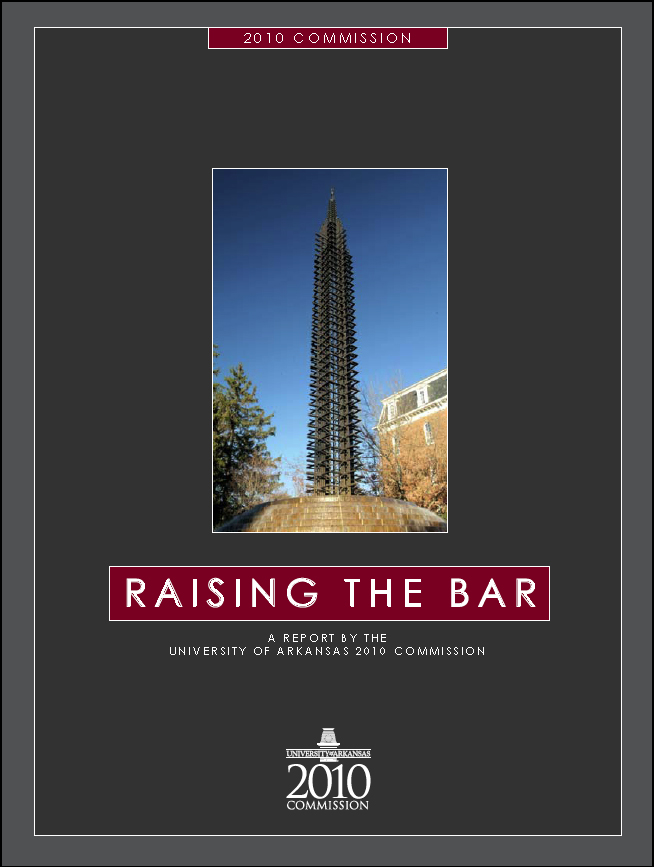FAYETTEVILLE, Ark. — The University of Arkansas, in its role as the state’s largest institution of higher education, is leading the way in improving the lives of Arkansans, but the 2010 Commission says that state and business leaders need to give higher education more support if Arkansas is to emerge as a leader in world competition.
That is the basic case presented in the newest report from the university’s 2010 Commission, “Raising the Bar,” which is both a progress report and a challenge to university and state leaders. It demonstrates that the university is making progress toward the goals set for the first decade of the 21st century, and establishing itself as a “nationally competitive, student-centered research university serving Arkansas and the world.” However, the report also points out national developments that will make it necessary to “raise the bar” if the state and university are going to stay competitive.
The 2010 Commission is a group of more than 90 business, government and academic leaders formed by Chancellor John A. White in 2000. The commission is charged with constructing a plan to use the University of Arkansas as a tool to bring the state of Arkansas to a higher level of economic and educational achievement among the states.
In this, its fourth report, the 2010 Commission makes a total of 40 recommendations. Some are new, and reflect changes in the competitive landscape; several are built upon previous recommendations that have been successfully implemented; others have been recommended in previous commission reports.
Most of the new recommendations in the current report concern the increasing cost of higher education, the struggle to achieve diversity on campus, the globalization of the world economy, and the issue of sustainability. The 2010 Commission recommends:
- Increasing need-based financial aid through Pell Grants and Arkansas Academic Challenge grants.
- Sponsoring workshops to prepare students to take the ACT, and need-based funding to help students retake the exam when necessary.
- Coordinating government, business and academic support for the new Arkansas World Trade Center.
- Business community backing for a series of policies promoted in three national reports on higher education and the world economy
- Supporting the UA’s effort to become a model for a sustainable university.
“Raising the Bar” also marks the first time the 2010 Commission has included recommendations for Arkansas’ congressional delegation in its report. These recommendations involve federal funding for university research, increased financial aid, support for the Arkansas World Trade Center and the clean up of the SEFOR nuclear reactor site in Washington County.
The report recognizes that some previous recommendations have been put into effect, at least in part. The development and adoption of the Arkansas Department of Higher Education’s funding formula was supported in the 2010 Commission’s earlier reports. In “Raising the Bar” the commission now recommends that the governor and General Assembly provide full funding for higher education according to the formula.
A major step toward fulfilling another earlier recommendation came in November, when Arkansas voters overwhelmingly approved a bond issue that will provide higher education with $150 million for capital improvements. The current report points out, however, that state colleges and universities have an immediate need for $1.3 billion for new buildings and academic infrastructure. In light of this, the 2010 Commission recommends that Arkansas follow the example of neighboring states and create a capital improvement fund for higher education.
These recommendations address the challenges posed to the university by stepped up competition from other schools, and the challenges posed to the state economy by increased competition in the global economy. They are part of the commission’s effort to “raise the bar” and adjust the state’s goals as the year 2010 approaches.
The remaining recommendations primarily address the need for Arkansas business and government to invest in higher education as the key to building a strong and competitive economy. The recommendations to the state government include:
- Increasing state funding for university research.
- Providing state matching funds for private gifts to higher education.
- Creating incentives to attract high-tech companies to Arkansas and keep them here.
- Encouraging collaboration between the state’s two- and four-year institutions.
For business leaders, the recommendations mainly involve hiring employees with college degrees, encouraging and enabling other employees to get college degrees, and paying these employees nationally competitive salaries. The 2010 Commission also recommends that businesses work with colleges and universities to develop the workforce skills that will be needed in the future.
“Raising the Bar” provides evidence that the University of Arkansas is making progress toward its institutional goals for the year 2010. A performance chart shows the progress the university has made since 1997 in two dozen categories. There is also an appendix showing how the university compares with 53 other nationally recognized research institutions in many of these same categories. The report makes 13 recommendations that essentially call on the university to achieve all of its stated goals, including:
- An enrollment of 22,500 students, including 4,000 minority students.
- A freshman retention rate of 88 percent.
- A six-year graduation rate of 66 percent.
- Annual research grants of $350 million.
- Annual private donations of $100 million.
- An endowment of $1 billion.
The 2010 Commission Report was released at 10:30 a.m. Tuesday, March 6, during a news conference in the Governor’s Conference Room in the State Capitol. UA Chancellor John White made a presentation to the news media, members of the commission and other guests based on highlights from the report.
A downloadable PDF of Raising The Bar is available on the Chancellor's web site at http://chancellor.uark.edu/101.htm
Topics
Contacts
,
